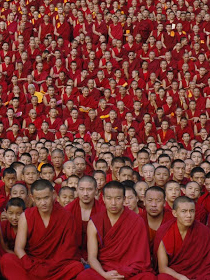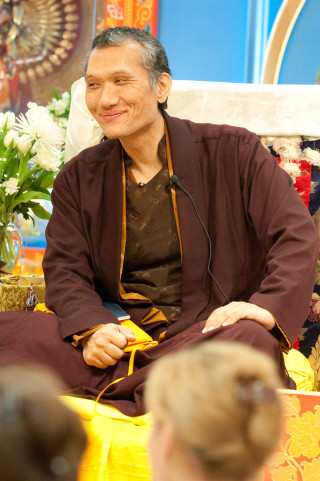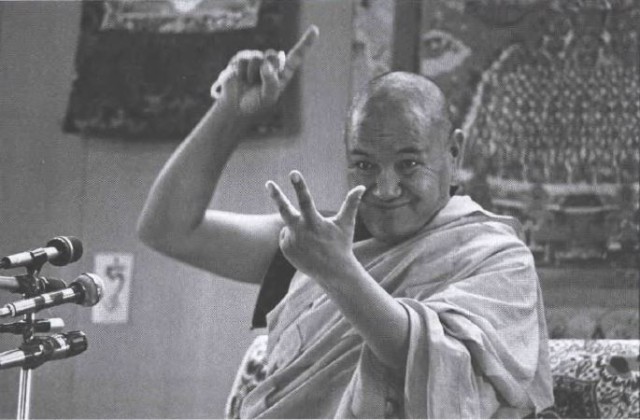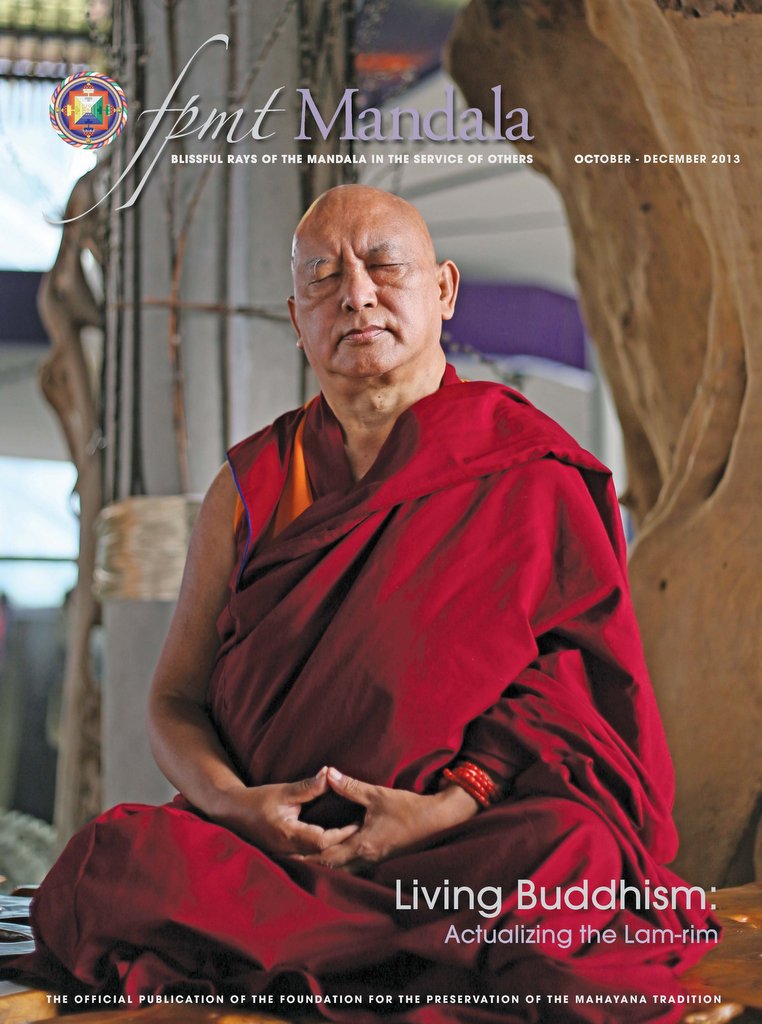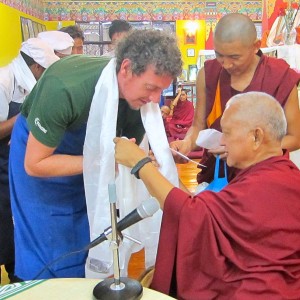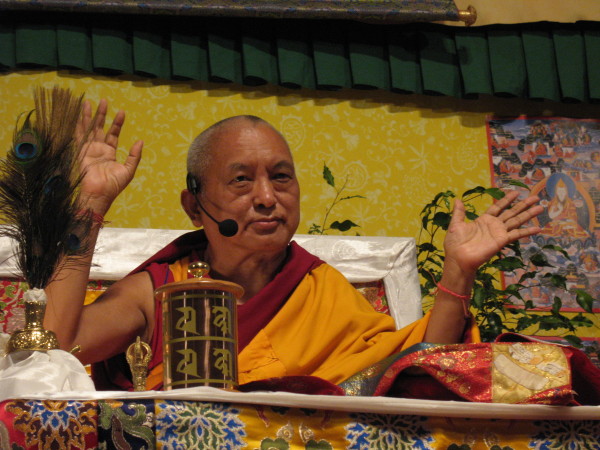- Home
- FPMT Homepage
Foundation for the Preservation of the Mahayana Tradition
The FPMT is an organization devoted to preserving and spreading Mahayana Buddhism worldwide by creating opportunities to listen, reflect, meditate, practice and actualize the unmistaken teachings of the Buddha and based on that experience spreading the Dharma to sentient beings. We provide integrated education through which people’s minds and hearts can be transformed into their highest potential for the benefit of others, inspired by an attitude of universal responsibility and service. We are committed to creating harmonious environments and helping all beings develop their full potential of infinite wisdom and compassion. Our organization is based on the Buddhist tradition of Lama Tsongkhapa of Tibet as taught to us by our founders Lama Thubten Yeshe and Lama Thubten Zopa Rinpoche.
- Willkommen
Die Stiftung zur Erhaltung der Mahayana Tradition (FPMT) ist eine Organisation, die sich weltweit für die Erhaltung und Verbreitung des Mahayana-Buddhismus einsetzt, indem sie Möglichkeiten schafft, den makellosen Lehren des Buddha zuzuhören, über sie zur reflektieren und zu meditieren und auf der Grundlage dieser Erfahrung das Dharma unter den Lebewesen zu verbreiten.
Wir bieten integrierte Schulungswege an, durch denen der Geist und das Herz der Menschen in ihr höchstes Potential verwandelt werden zum Wohl der anderen – inspiriert durch eine Haltung der universellen Verantwortung und dem Wunsch zu dienen. Wir haben uns verpflichtet, harmonische Umgebungen zu schaffen und allen Wesen zu helfen, ihr volles Potenzial unendlicher Weisheit und grenzenlosen Mitgefühls zu verwirklichen.
Unsere Organisation basiert auf der buddhistischen Tradition von Lama Tsongkhapa von Tibet, so wie sie uns von unseren Gründern Lama Thubten Yeshe und Lama Thubten Zopa Rinpoche gelehrt wird.
- Bienvenidos
La Fundación para la preservación de la tradición Mahayana (FPMT) es una organización que se dedica a preservar y difundir el budismo Mahayana en todo el mundo, creando oportunidades para escuchar, reflexionar, meditar, practicar y actualizar las enseñanzas inconfundibles de Buda y en base a esa experiencia difundir el Dharma a los seres.
Proporcionamos una educación integrada a través de la cual las mentes y los corazones de las personas se pueden transformar en su mayor potencial para el beneficio de los demás, inspirados por una actitud de responsabilidad y servicio universales. Estamos comprometidos a crear ambientes armoniosos y ayudar a todos los seres a desarrollar todo su potencial de infinita sabiduría y compasión.
Nuestra organización se basa en la tradición budista de Lama Tsongkhapa del Tíbet como nos lo enseñaron nuestros fundadores Lama Thubten Yeshe y Lama Zopa Rinpoche.
A continuación puede ver una lista de los centros y sus páginas web en su lengua preferida.
- Bienvenue
L’organisation de la FPMT a pour vocation la préservation et la diffusion du bouddhisme du mahayana dans le monde entier. Elle offre l’opportunité d’écouter, de réfléchir, de méditer, de pratiquer et de réaliser les enseignements excellents du Bouddha, pour ensuite transmettre le Dharma à tous les êtres. Nous proposons une formation intégrée grâce à laquelle le cœur et l’esprit de chacun peuvent accomplir leur potentiel le plus élevé pour le bien d’autrui, inspirés par le sens du service et une responsabilité universelle. Nous nous engageons à créer un environnement harmonieux et à aider tous les êtres à épanouir leur potentiel illimité de compassion et de sagesse. Notre organisation s’appuie sur la tradition guéloukpa de Lama Tsongkhapa du Tibet, telle qu’elle a été enseignée par nos fondateurs Lama Thoubtèn Yéshé et Lama Zopa Rinpoché.
Visitez le site de notre Editions Mahayana pour les traductions, conseils et nouvelles du Bureau international en français.
Voici une liste de centres et de leurs sites dans votre langue préférée
- Benvenuto
L’FPMT è un organizzazione il cui scopo è preservare e diffondere il Buddhismo Mahayana nel mondo, creando occasioni di ascolto, riflessione, meditazione e pratica dei perfetti insegnamenti del Buddha, al fine di attualizzare e diffondere il Dharma fra tutti gli esseri senzienti.
Offriamo un’educazione integrata, che può trasformare la mente e i cuori delle persone nel loro massimo potenziale, per il beneficio di tutti gli esseri, ispirati da un’attitudine di responsabilità universale e di servizio.
Il nostro obiettivo è quello di creare contesti armoniosi e aiutare tutti gli esseri a sviluppare in modo completo le proprie potenzialità di infinita saggezza e compassione.
La nostra organizzazione si basa sulla tradizione buddhista di Lama Tsongkhapa del Tibet, così come ci è stata insegnata dai nostri fondatori Lama Thubten Yeshe e Lama Zopa Rinpoche.
Di seguito potete trovare un elenco dei centri e dei loro siti nella lingua da voi prescelta.
- 欢迎 / 歡迎
简体中文
“护持大乘法脉基金会”( 英文简称:FPMT。全名:Foundation for the Preservation of the Mahayana Tradition) 是一个致力于护持和弘扬大乘佛法的国际佛教组织。我们提供听闻,思维,禅修,修行和实证佛陀无误教法的机会,以便让一切众生都能够享受佛法的指引和滋润。
我们全力创造和谐融洽的环境, 为人们提供解行并重的完整佛法教育,以便启发内在的环宇悲心及责任心,并开发内心所蕴藏的巨大潜能 — 无限的智慧与悲心 — 以便利益和服务一切有情。
FPMT的创办人是图腾耶喜喇嘛和喇嘛梭巴仁波切。我们所修习的是由两位上师所教导的,西藏喀巴大师的佛法传承。
繁體中文
護持大乘法脈基金會”( 英文簡稱:FPMT。全名:Found
ation for the Preservation of the Mahayana Tradition ) 是一個致力於護持和弘揚大乘佛法的國際佛教組織。我們提供聽聞, 思維,禪修,修行和實證佛陀無誤教法的機會,以便讓一切眾生都能 夠享受佛法的指引和滋潤。 我們全力創造和諧融洽的環境,
為人們提供解行並重的完整佛法教育,以便啟發內在的環宇悲心及責 任心,並開發內心所蘊藏的巨大潛能 — 無限的智慧與悲心 – – 以便利益和服務一切有情。 FPMT的創辦人是圖騰耶喜喇嘛和喇嘛梭巴仁波切。
我們所修習的是由兩位上師所教導的,西藏喀巴大師的佛法傳承。 察看道场信息:
- FPMT Homepage
- News/Media
-
- Study & Practice
-
-
- About FPMT Education Services
- Latest News
- Programs
- New to Buddhism?
- Buddhist Mind Science: Activating Your Potential
- Heart Advice for Death and Dying
- Discovering Buddhism
- Living in the Path
- Exploring Buddhism
- FPMT Basic Program
- FPMT Masters Program
- FPMT In-Depth Meditation Training
- Maitripa College
- Lotsawa Rinchen Zangpo Translator Program
- Universal Education for Compassion & Wisdom
- Online Learning Center
-
- Prayers & Practice Materials
- Overview of Prayers & Practices
- Full Catalogue of Prayers & Practice Materials
- Explore Popular Topics
- Benefiting Animals
- Chenrezig Resources
- Death & Dying Resources
- Lama Chopa (Guru Puja)
- Lama Zopa Rinpoche: Compendium of Precious Instructions
- Lama Zopa Rinpoche: Life Practice Advice
- Lama Zopa Rinpoche Practice Series
- Lamrim Resources
- Mantras
- Prayer Book Updates
- Purification Practices
- Sutras
- Thought Transformation (Lojong)
- Audio Materials
- Dharma Dates - Tibetan Calendar
- Translation Services
- Publishing Services
- Ways to Offer Support
- Prayers & Practice Materials
-
- Teachings and Advice
- Find Teachings and Advice
- Lama Zopa Rinpoche Advice Page
- Lama Zopa Rinpoche: Compendium of Precious Instructions
- Lama Zopa Rinpoche Video Teachings
- ༧སྐྱབས་རྗེ་བཟོད་པ་རིན་པོ་ཆེ་མཆོག་ནས་སྩལ་བའི་བཀའ་སློབ་བརྙན་འཕྲིན།
- Podcasts
- Lama Yeshe Wisdom Archive
- Buddhism FAQ
- Dharma for Young People
- Resources on Holy Objects
- Teachings and Advice
-
-
*If a menu item has a submenu clicking once will expand the menu clicking twice will open the page.
-
-
- Centers
-
- Teachers
-
- Projects
-
-
-
-
*If a menu item has a submenu clicking once will expand the menu clicking twice will open the page.
-
-
- FPMT
-
-
-
-
-
Unlike an external enemy, the inner enemy cannot regroup and launch a comeback once it has been destroyed from within.
His Holiness the Dalai Lama
-
-
-
- Shop
-
-
-
The Foundation Store is FPMT’s online shop and features a vast selection of Buddhist study and practice materials written or recommended by our lineage gurus. These items include homestudy programs, prayers and practices in PDF or eBook format, materials for children, and other resources to support practitioners.
Items displayed in the shop are made available for Dharma practice and educational purposes, and never for the purpose of profiting from their sale. Please read FPMT Foundation Store Policy Regarding Dharma Items for more information.
-
-
Advice from Spiritual Friends
Founder and president of Maitripa College Yangsi Rinpoche talks about the development of mindfulness in the August-September 2007 issue of Mandala:
In order to have a faultless practice of calm abiding, we need to develop very strong concentration supported by very strong mindfulness and wisdom. Wisdom in this case refers to the function of mind called introspection, which acts as a kind of security guard for the mind – watching for faults or weaknesses that may arise in our concentration. We should train in the mindfulness possessing three qualities. Our mindfulness must be able to remember the aspect of our object of concentration. It must have the ability to hold that aspect, and it must not be distracted by other objects.
You should seek to develop a concentration that is stable and lasting. In order to be able to bring this about, mindfulness is very important. Of course, even in terms of our ordinary perception, every primary mind is accompanied by five determining factors, one of which is mindfulness. …
From Mandala August-September 2007
18
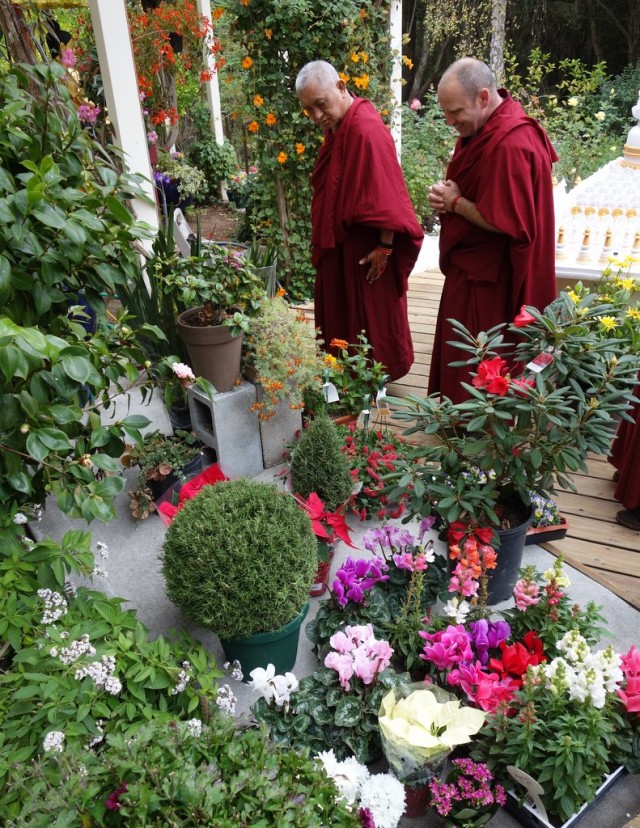
Lama Zopa Rinpoche after a trip to the local garden shop directing where the flowers go and creating beautiful offerings to all the gurus, buddhas and bodhisattvas and holy beings! Kachoe Dechen Ling, Aptos, California, November 17, 2013. Photo by Ven. Roger Kunsang.
[When] you go shopping, watch your motivation, prepare your motivation. When you are in the shop either fulfill the wishes of the guru or shop to benefit and serve other sentient beings. Think that the ultimate purpose is to fulfill the guru’s advice. So you buy these things to survive and to fulfill the wishes of the guru or benefit sentient beings. In this way shopping becomes the antidote to attachment, becomes virtuous activity, Dharma, and you collect extensive merit.
– Lama Zopa Rinpoche, from the advice “Making Ordinary Life Actions Meaningful,” 2007
More advice can be found on the page “Advice from Lama Zopa Rinpoche.”
Learn more about Lama Zopa Rinpoche, spiritual director of the Foundation for the Preservation of Mahayana Tradition (FPMT), and Rinpoche’s vision for a better world. Sign up to receive news and updates.
- Tagged: daily living, mandala
- 0
14
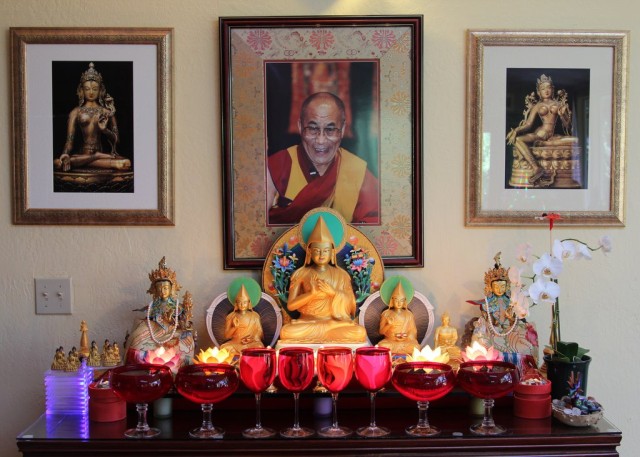
One of the altars at Kachoe Dechen Ling, Aptos, California, November 2013. Photo by Ven. Roger Kunsang.
“… All the suffering of samsara comes from the mind. Happiness, liberation and enlightenment come from the mind. Suffering comes from the unsubdued mind. Liberation and enlightenment come from the subdued mind, therefore, subduing the mind is essential. So what Buddha said is just an example, manifesting numberless forms naturally without effort – as impure forms to sentient beings who have an impure mind, and as pure forms to sentient beings with a pure mind,” Lama Zopa Rinpoche wrote to a new student in a letter recently posted to Lama Yeshe Wisdom Archive’s “Lama Zopa Rinpoche Online Advice Book.”
The letter continues:
“In Buddhism, especially in Mahayana Buddhism, guru devotion is the root of the path to enlightenment. The Buddha’s 84,000 teachings have three levels. There are the Hinayana (Lesser Vehicle) teachings for the lower capable being. For those with greater intelligence and capacity, Buddha revealed the Mahayana Paramitayana teachings. Then for those with higher intelligence, merit or capacity, Buddha taught Mahayana Secret Mantra – Vajrayana.
“In Hinayana, we don’t look at the guru as a buddha, but we respect the guru as if he is a buddha and we obey the guru, the abbot who grants ordination and gives teachings. In Mahayana Paramitayana, we look at the guru as a buddha, having no mistakes but only qualities. In tantra, on that basis – seeing the guru as a buddha – we look at the guru in the pure form of a buddha, we look at the essence as a buddha.
“Obedience is most important, otherwise we cannot achieve realizations; we cannot achieve enlightenment. …”
You can read the entire letter on the Lama Yeshe Wisdom Archive website.
Lama Zopa Rinpoche is the spiritual director of the Foundation for the Preservation of Mahayana Tradition (FPMT), an organization dedicated to preserving Mahayana Buddhism through offering the Buddha’s authentic teachings and to facilitating reflection, meditation, practice and the opportunity to actualize and directly experience the Buddha’s teachings. Sign up to receive news and updates.
- Tagged: guru devotion, lama zopa rinpoche, mandala
- 0
5
By Lama Zopa Rinpoche
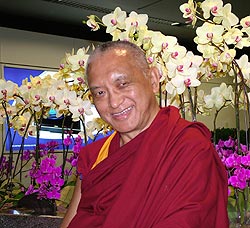
Lama Zopa Rinpoche
To love oneself is not contradictory to what Mahayana Buddhism teaches. The Mahayana teachings are not saying one should not love oneself. Renouncing oneself and cherishing others is not contradictory to loving yourself. In fact, practicing the Mahayana teaching, bodhichitta, is the best way to love yourself, to take care of yourself.
Whatever we do with our body, speech, and mind is for happiness. Even the activities of the tiniest insects, like the ants we see running around and keeping so busy, are also to achieve happiness. By looking at ourselves and at other living beings, we can see that it is the same: whatever we do is to achieve happiness.
A “problem” is what we do not want to experience and “happiness” is what we want to achieve. With this mind we can stop the problems, stop all the undesirable experiences, and with this mind we can achieve every happiness. Why is this? Because problems and happiness do not come from outside. The creator of problems and happiness is oneself in past lives. Therefore, with this mind all our problems can be stopped and we can achieve temporal day-to-day happiness and ultimate happiness, full enlightenment. …
From Mandala April-May 2006
4
By Lama Yeshe
If you recognize non-duality, you’ll have no fear. All fear and insecurity comes from not being realistic, from the wrong conception that holds fearful objects as concrete self-entities. A story from the life of Tibet’s great yogi, Jetsun Milarepa, illustrates this point.
Once Milarepa left his cave to collect wood, and when he returned, he saw a terrifying face with big eyes glaring at him. It blew his mind. But he looked carefully at the face and meditated on it as illusory, and later wrote a song about this experience. By removing the conception that identified that horrible image as a concrete self-entity, it disappeared. This is not a fairy tale; this is a meditator’s experience.
People scare themselves with thoughts of ghosts and demons. It is all superstition, the wrong conception believing in a self-entity There’s no such thing. But when you have a superstitious belief, for some reason it manifests. So you say, “It’s real. I saw it.” What you you saw is important? That’s completely ridiculous. What you see is absolutely unimportant. You need to know that. People in the West set incredible store by what they see; they really do believe that seeing is believing, that what they see is real. This basic misconception also engenders a kind of pride: “I saw that he is this, therefore, he is this.” “I saw” makes your ego proud. This is a completely wrong conception.
From Mandala February-March 2006
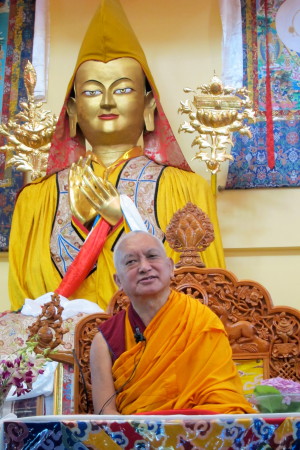
Lama Zopa Rinpoche teaching at Tushita Meditation Centre, Dharamsala, India, June 2013. Photo by Ven. Sarah Thresher.
In Mandala October-December 2013, Lama Zopa Rinpoche responds to a long-time student who wrote to Rinpoche in thanks for his “blessings, guidance and protection” over many years. The anonymous student currently takes care of her mother who suffers physically after a series of strokes. As a method to deal with the challenges of caregiving, the student visualizes taking care of Rinpoche when taking care of her mother.
“I know I have not developed special qualities,” concludes the student. “Without your teachings, without your example and blessings, without your guidance and protection, it would have been unbearable to face all this.”
First of all, it is really great the meditation you are doing: serving your mother and thinking you are serving the guru. When I was in Tibet (not the last time, but the time before) our journey took us to Reting, Lama Dromtönpa’s monastery, which he built on the advice of Lama Atisha. I didn’t know, but our guide directed the tour through His Holiness the Karmapa’s monastery in Tshurpu. We stayed there one day and slept outside the monastery in tents for two nights. I went to visit nearly every temple in the monastery. The monks were doing puja and I personally made money offering to each one, handing them the money myself. As I did this, I started to think that each one was my guru, His Holiness Trijang Rinpoche or Lama Yeshe (maybe the first one). This is what I was thinking as I gave the money, so I collected the most extensive merits and accumulated the most powerful purification because I was thinking of each monk as the guru.
So first of all, this life’s parents are very powerful objects of merit. Even very small negative or positive actions done towards this life’s parents are extremely powerful. Therefore, as a result of offering service to your mother, you will have so much happiness even in this life, your wishes will succeed and you will have a very good life. And the result is experienced not only this life; each positive action of offering service that you create towards the parents will bring benefit for thousands of lifetimes. It brings a good rebirth and unbelievable, unbelievable, unbelievable happiness while you are in samsara. I’m talking about each small service; every one results in happiness for thousands of lifetimes. So can you imagine the result of twenty-four hours of service? Wow, wow, wow, wow, wow, wow. Then, if the service is done with bodhichitta, each one is the cause of enlightenment. The merit of every small service, every virtue created is so powerful. …
From Mandala October-December 2013
If you like what you read on Mandala, consider becoming a Friend of FPMT, which supports our work.
- Tagged: mandala, teachings and advice
- 0
9
Achieving Realizations of the Path
Lama Zopa Rinpoche has recently been commenting on the need for FPMT students to actualize the lam-rim teachings and achieve realizations. You can read Rinpoche’s recent advice in the just-published Mandala October-December 2013:
Special group of retreatants
First of all, I want to say that the FPMT has been developing now for many years and over that time people have been studying and practicing the Dharma according to their ability. Generally, when I look at the FPMT organization, what I see is that the students have developed more compassion and good-heartedness. This is extremely worthwhile because compassion for all sentient beings is the very heart of Buddhism; it is the most important Dharma practice for the happiness of the individual students, for their families, for society, for the country, for the world and for the six realms’ sentient beings.
There has been a lot of study and the study is going well; there is Discovering Buddhism, the Basic Program and the Masters Program. Particularly in the Gelugpa tradition there is a lot of teaching and learning philosophy, and in the FPMT organization we have been doing that. Buddhist philosophy is now being studied in almost every center, especially where there is a resident geshe. We even have Western students who have completed the Masters Program and can teach philosophy where there is no geshe, or even where there is a geshe. There are more centers teaching the Masters Program and some centers have already taught the Basic Program several times. People have been learning about Buddhism, and especially the lam-rim, for quite some time now in the FPMT and there are some who are also trying to meditate and practice the lam-rim.
Now what is needed are people who will sacrifice their lives, as they did in India, Tibet and Nepal, not just to study the Dharma like at a college or university, but to actualize the teachings in a monastery or isolated place. In Tibet, the mountains were full of caves like ants’ nests, where people would go to practice without distraction. When I came from Solu Khumbu [in Nepal] to Tashi Lhunpo Monastery in Tsang [Tibet] and then on to Pagri [in Tibet] there were many caves along the road where meditators would practice with hardship and the realizations of guru devotion, renunciation, bodhichitta, right view and the two stages of tantra would all come. Wow, wow, wow. It’s unbelievable! That’s why the country of Tibet is so blessed and so precious because there are many, many caves where meditators, like Milarepa, for example, achieved different realizations, such as the rainbow body.
This is how Buddhism really comes alive – when it is not just words, not just scholars, but really living Buddhism. When study and realization come together, Buddhism will really last. Wow, then like an ocean in the heart and the mind, it will spread and be preserved. …
From Mandala October-December 2013
If you like what you read on Mandala, consider becoming a Friend of FPMT, which supports our work.
- Tagged: mandala, teachings and advice
- 0
2
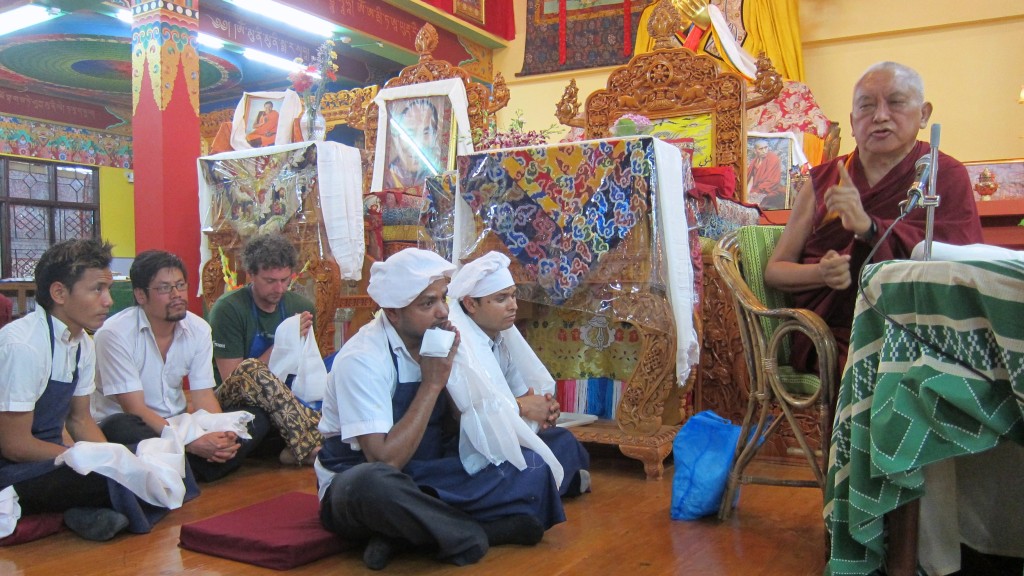
Lama Zopa Rinpoche giving advice to the cooks of Tushita Meditation Centre, Dharamsala, India, June 2013. Photo by Ven. Sarah Thresher.
During Lama Zopa Rinpoche’s most recent visit to Tushita Meditation Centre in Dharamsala, India, Rinpoche gave the following advice to the Tushita cooks:
I have been hearing from people that the food at Tushita is fantastic. Generally, they tell me they are very happy with the place and especially the food. I was amazed to hear this and particularly that you have been able to improve the flavor and quality of the food without using onions, garlic or other black foods. Of course, the initial reason why people come to Tushita is not the food, but for the teachings and meditations; they are a little bored with the lives they have and are looking for something new. However, the conditions at Tushita –and especially the food – are a very important support for the teachings and meditations. Sometimes in the past, for example, when I would teach on impermanence, the hells and the eight worldly dharmas, people would get scared and leave, but if the food was good, they would stay. That’s one way to keep them!
So I’ve been thinking for many days to come to the kitchen and explain a short meditation to the cooks. There is a short morning motivation I have put together with a direct meditation on the graduated path to the peerless happiness of full enlightenment. (Most of the time in English we use the expression “fully enlightened” but in Tibetan it is sang gye; sang means that all the obscurations, gross and subtle have been purified, and gye that all the realizations have been fully developed and there is nothing more to achieve. “Fully enlightened” has a different meaning; it’s better to say “fully omniscient mind.”) [This meditation is] followed by some verses explaining how precious and kind sentient beings are.
Every single sentient being is most precious, dear and wishfulfilling – fulfilling all your wishes for the happiness of future lives, liberation and enlightenment. Every hell being, hungry ghost, animal, insect, ant, mosquito, bird, goat, human being, sura and asura does this. That is because all our beginningless past lives’ happiness, present happiness and future happiness comes from good karma and that good karma comes from your mind, from mental intention. Buddha’s enlightened activity is of two types: one comes from Buddha’s holy mind and one from your mind. Buddhas come from bodhisattvas, bodhisattvas come from bodhichitta and bodhichitta comes from great compassion. Great compassion comes from every single obscured suffering sentient being. There is no way to generate great compassion without depending on every single suffering sentient being. Therefore, there is no bodhichitta, no bodhisattva, no Buddha and no way to create good karma, the cause of happiness, without them. In other words, every single happiness and comfort comes from sentient beings, even a cool breeze or a drink of water when you are thirsty. Without sentient beings there is no way to experience happiness in this life, future lives, liberation or enlightenment. All our happiness comes from every single sentient being.
For example, all my happiness comes from every one of you and from all the rest of the sentient beings; every hell being, hungry ghost, animal, human, sura and asura. All my past, present and future happiness comes from everyone because Buddha, Dharma and Sangha in whom I take refuge and with whom I purify every single negative karma and achieve the peerless happiness of full enlightenment come from everyone. That is why sentient beings are most kind, dear, precious and wishfulfilling.
Sentient beings are more precious than a wishfulfilling jewel because you can’t practice morality, purify negative karma and achieve a higher rebirth with a wishfulfilling jewel. Nor can you practice the three higher trainings and achieve the ultimate happiness of liberation or generate great compassion and achieve enlightenment with a wishgranting jewel, but you can with sentient beings. If you pray to a wishgranting jewel you can get a house, car, swimming pool and so on, but not higher rebirths, liberation and enlightenment. That’s why sentient beings are most unbelievably precious. Which one is more precious – skies of wishgranting jewels or sentient beings? Sentient beings are more precious!
Therefore, dedicating your life to others and helping them is the best, most exciting thing you can do. Serving them in any way you can and giving them whatever help you can give is what brings the most happiness. For example, helping an old man carrying a very heavy load or giving your seat to somebody in a bus, train or car. Doing whatever it is that sentient beings need, whether big or small, is the most satisfying, exciting thing you can do.
That’s why making delicious food and offering it to the people who come here is a really great opportunity. Wow, wow, wow, wow. It is a way of offering comfort and happiness to sentient beings who are most wishfulfilling. That’s what brings the most happiness and excitement. It’s the real Dharma. Dharma is something that protects your life, protects you from suffering and guides you to happiness….
There is a great deal to rejoice in that you have this very precious opportunity to offer food to sentient beings who are most precious, dear, kind and wishfulfilling.
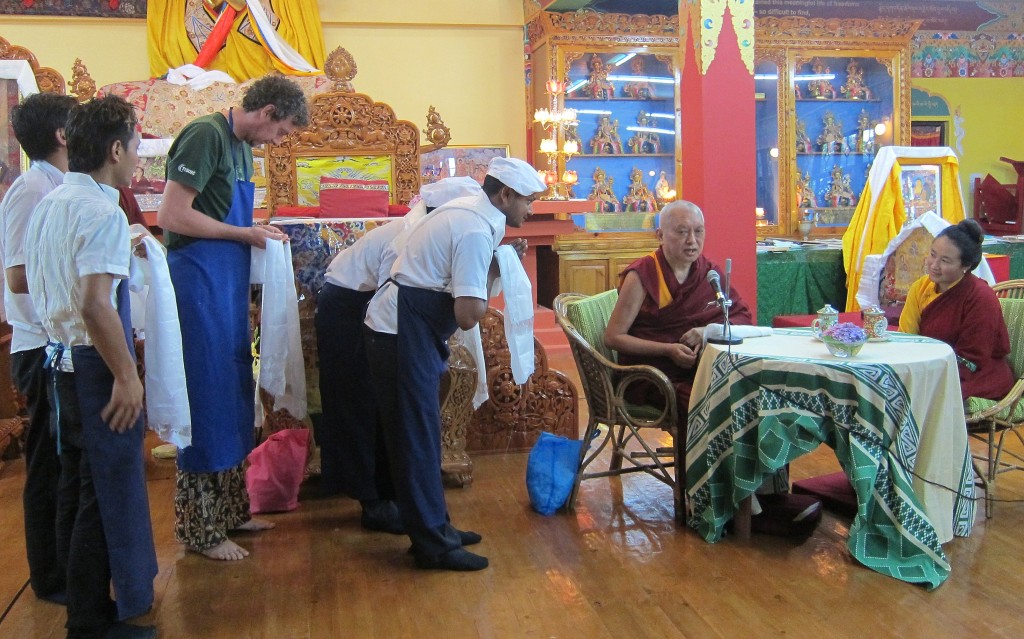
Lama Zopa Rinpoche and Khadro-la with Tushita Meditation Centre cooks, June 2013. Photo by Ven. Sarah Thresher.
Practicing bodhichitta mindfulness in the kitchen
Here are some ways to think while you are preparing and cooking the food:
When you are cutting anything, for example onions, think,
I am cutting the root of all sentient beings’ suffering which comes from ignorance and the self-cherishing thought, with the knife of the wisdom realizing emptiness (shunyata) and bodhichitta.
When you are washing pots and so on think,
I am washing away all the obscurations and negative karmas from all sentient beings’ minds.
You can think that you are washing away your own obscurations and negative karmas but most important is to think you are washing away those of all sentient beings. And you can think the water is nectar coming from Vajrasattva, the Guru, His Holiness the Dalai Lama, or Guru Shakyamuni Buddha. There is always a lot of washing up to do in the kitchen and you can use the opportunity to purify all sentient beings’ obscurations. It’s very good if you can sincerely think this way because all the washing up becomes Dharma practice purifying your negative karma and defilements and collecting merits. In India even the beggars keep their pots very clean!
When you are sweeping the floor think that the broom is the whole path to enlightenment, especially wisdom and bodhichitta, and that the dust is all sentient beings’ obscurations.
I am sweeping away the dust of all sentient beings’ obscurations with the broom of the path to enlightenment and especially wisdom and bodhichitta.
If you sincerely think this while you are cleaning it becomes real Dharma practice that benefits all sentient beings. In the lam-rim it says to think that you are abandoning the dust of the three poisonous minds – anger, attachment and ignorance – which are the gross obscurations and also the stains of the three poisonous minds, the subtle obscurations.
When you are kneading dough so that it can be made into any shape think,
I am taming all sentient beings’ minds by softening them with my two hands of the wisdom realizing emptiness and bodhichitta.
When you are making momos or shapale – rolling out pastry and filling it with cheese, potato and vegetables – think,
I am filling all sentient beings’ minds with the realizations of the path from guru devotion up to enlightenment so that they can actualize all the qualities of a buddha.
When you are cooking soup or other food you can think that the fire is the Six Yogas’ tummo fire that causes the kundalini to melt. Do the same meditation that is used to bless the inner offering in highest yoga tantra. Or you can think that the fire is the wisdom realizing emptiness and the uncooked food is the unsubdued mind. By cooking the food all the gross and even the subtle delusions are purified and all the realizations of Buddha are achieved.
These are some ways of thinking as you are working in the kitchen. You can think in a similar way with other kitchen activities.
Typed and edited by Ven. Sarah Thresher at Tushita Meditation Centre, Dharamsala, India, June 17, 2013.
Mandala brings you news of FPMT activities, teachers and events from over 160 FPMT centers, projects and services around the globe. If you have news you would like to share, please let us know.
- Tagged: cooking with bodhichitta, lama zopa rinpoche, mandala, teachings and advice, tushita meditation centre
- 0
10
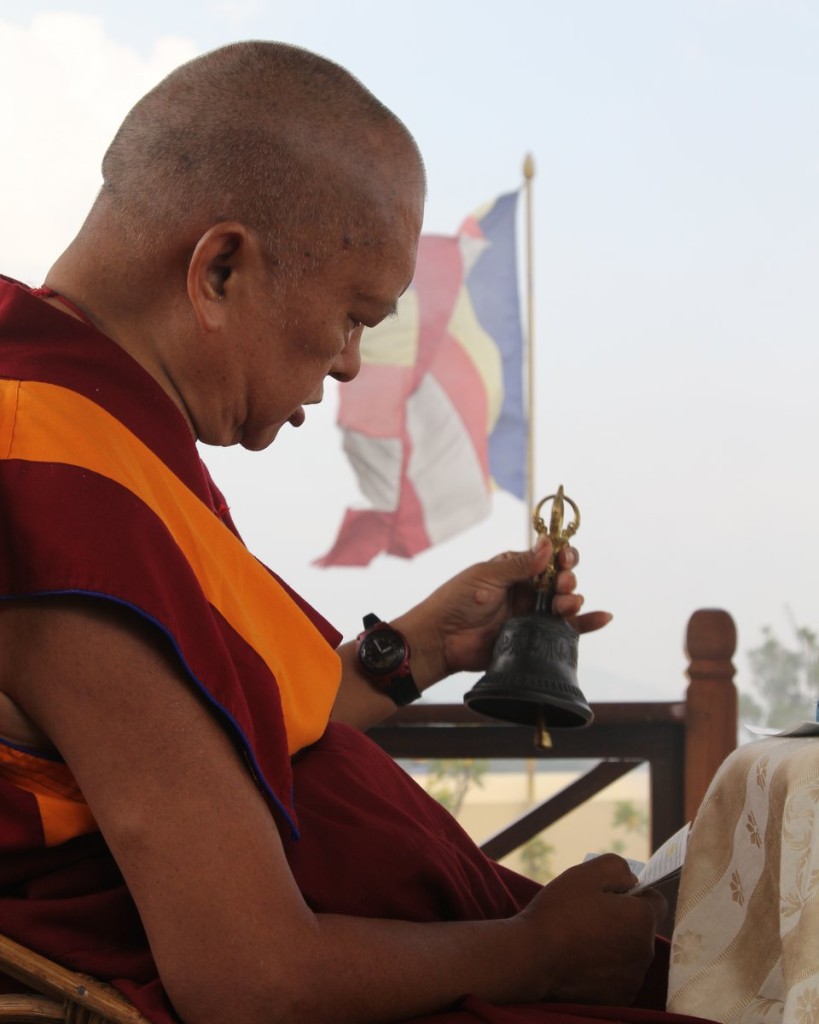
Lama Zopa Rinpoche doing incense puja at Kopan Monastery, Nepal, April 2013. Photo by Ven. Roger Kunsang.
While staying at Kopan Monastery in Nepal earlier this year, Lama Zopa Rinpoche gave an oral transmission of Lama Tsongkhapa’s Lekshe Nyingpo (Essence of True Eloquence). Here’s an edited extract from Rinpoche’s teaching before a transmission given in April 2013:
Lama Tsongkhapa mentioned that all the suffering in the world comes from ignorance; therefore the root of suffering is not outside. No matter how much scientific knowledge and education worldly people have they still believe the cause of suffering to be outside; but that’s wrong. The cause of suffering is in the mind and that’s why it is the mind that has to change. Changing the mind is more important than trying to change what’s outside; changing outside never finishes. Change has to come from the mind. It has to come from your mind.
The hell, hungry ghost and animal realms come from your mind, from your negative, impure mind and wrong way of thinking every moment and every day. While enlightenment, the fully awakened omniscient mind, liberation from samsara, and day-to-day happiness come from your mind and from the correct way of thinking, from positive thoughts. This is how everything comes from the mind.
For example, when you have problems in daily life, if you practice patience, compassion, thought transformation, bodhichitta, emptiness and so on, then at that time there are no more problems. In that hour and that minute when you change your mind and think differently the problems are gone. But when you don’t change your mind and keep thinking the old way, as people in the world generally do, believing that the root of suffering is outside even though they have so much scientific knowledge, well then the suffering never finishes. There is no end to suffering.
Lama Tsongkhapa mentioned that all the sufferings come from ignorance, but this is not just something stated by Lama Tsongkhapa; the more you learn Dharma and check scientifically, the more you discover and realize that this is true.
Excerpted from a teaching before a Lekshe Nyingpo lung at Kopan Monastery on April 13, 2013. Transcribed and edited by Ven. Sarah Thresher.
If you like what you read on Mandala, consider becoming a Friend of FPMT, which supports our work. Friends of FPMT at the Basic level and higher receive the print magazine Mandala, delivered quarterly to their homes.
- Tagged: lama zopa rinpoche, lekshe nyingpo, mandala, teachings and advice
- 0
24
Over the years, Mandala has explored the issue of vegetarianism and the question of whether or not to eat meat. But with a growing awareness of issues of animal cruelty and environmental concerns connected to the production of dairy products and eggs, many FPMT students have taken up the practice of veganism, including Nicholas Ribush, director of the Lama Yeshe Wisdom Archive. In this issue’s online edition, Nick explains his motivations for his decision in “On Becoming a Vegan.”
At the 2009 CPMT meeting in France, Nick asked Rinpoche about veganism, to which Rinpoche gives an expansive and motivational response.
Nick Ribush: Rinpoche, how do you feel about FPMT promoting a policy of not only vegetarianism, but also veganism, because of the cruelty to animals inherent in the production of dairy products and so forth?
Lama Zopa Rinpoche: The reality is that we cannot live without harming others. There’s no way we can survive without others being harmed, killed. We can’t survive for even a day without causing suffering to others.
This is how life is in samsara and that’s why the ultimate answer is to get out of samsara, to be liberated from it. Only when you free yourself from samsara by actualizing the remedy, the true path, the wisdom directly perceiving emptiness, which directly terminates the delusions, the disturbing thought obscurations, and the negative imprints, the seeds of delusion, will you no longer have to reincarnate, no longer have to go through the cycle of death and rebirth, experiencing all the sufferings of the six realms, one after the other.
It’s only when you’re liberated from samsara that others don’t have to suffer for your happiness, only then that others don’t have to be harmed or killed in order for you to survive. Therefore, actualizing the path is of the utmost urgency; that’s the emergency …
Read the full teaching as part of Mandala‘s July-September 2013 online content …
- Tagged: mandala, teachings and advice
- 0
3

His Holiness the Dalai Lama, Bodhgaya, 1974. Image courtesy of Lama Yeshe Wisdom Archive.
“In January 1974 His Holiness the Dalai Lama bestowed the Kalachakra (Wheel of Time) initiation for the fifth time in his life, and the third since leaving Tibet,” writes Adele Hulse, author of Big Love, the forthcoming biography of FPMT founder Lama Thubten Yeshe. Lama Yeshe Wisdom Archive will publish Big Love later this year and has been sharing excerpts from the book on their Big Love blog. The following is from a recent post:
The profound Kalachakra Tantra, a pathway to full enlightenment, contains elements of astrology, medicine, and mathematics. Over 100,000 Tibetans descended on Bodhgaya. They came by train, bus, rickshaw, and on foot from many places inside and outside India: Dharamsala, Darjeeling, Dalhousie, Mysore, and Bangalore; from Ladakh, Bhutan, Sikkim, Nepal, and Tibet, many of them wearing local costumes and jewelry. Tent cities sprang up with bustling restaurants serving all types of Tibetan and Indian food — momos (Tibetan meat dumplings), thukpa (Tibetan meat stew), samosas, chai, and the like — alongside market stalls selling clothes, religious objects, and antiques. It was a scene out of National Geographic magazine.
Several hundred Westerners also poured into Bodhgaya for the initiation. Many of them stayed in the Tibetan tent-restaurants, which allowed people to sleep on the wide benches at night. The hippies in their motley garb mixed easily with the wild folk from the mountains, the men in sheepskin trousers, their long plaits woven with red ribbon. For many Tibetans it was their first sight of the Dalai Lama. They prostrated and cried loudly. All day and all night pilgrims circumambulated the Mahabodhi stupa on its three different walkways, many prostrating all the way around.
Everybody at Kopan who could get to Bodhgaya went there. When asked to explain the Kalachakra initiation, Lama Yeshe became very serious, telling the students this was not something they should take lightly. …
Read the entire post by Adele Hulse — which includes Lama Yeshe’s teaching to Westerners in preparation for the initiation — on the Big Love blog.
- Tagged: big love, his holiness the dalai lama, kalachakra, lama yeshe, mandala
- 0
11
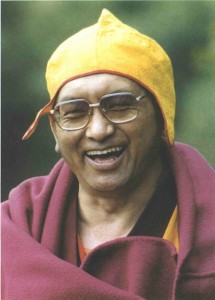
Photo by Bob Cayton
“It is extremely important to know how to live our daily life. We need to know what is spiritual practice and what is not spiritual, or what is Dharma and what is not Dharma. The benefit of understanding this, of having this wisdom, is unbelievable, is infinite.
“What we have to realize is that all of our activities throughout twenty-four hours – walking, sitting, sleeping, talking, doing our job – can become a cause for enlightenment, for liberation, for happiness in future lives; or for the lower realms. It all depends on our motivation.”
Read Lama Zopa Rinpoche’s complete teaching …
From Mandala March 2001
- Tagged: mandala, teachings and advice
- 0
- Home
- News/Media
- Study & Practice
- About FPMT Education Services
- Latest News
- Programs
- New to Buddhism?
- Buddhist Mind Science: Activating Your Potential
- Heart Advice for Death and Dying
- Discovering Buddhism
- Living in the Path
- Exploring Buddhism
- FPMT Basic Program
- FPMT Masters Program
- FPMT In-Depth Meditation Training
- Maitripa College
- Lotsawa Rinchen Zangpo Translator Program
- Universal Education for Compassion & Wisdom
- Online Learning Center
- Prayers & Practice Materials
- Overview of Prayers & Practices
- Full Catalogue of Prayers & Practice Materials
- Explore Popular Topics
- Benefiting Animals
- Chenrezig Resources
- Death & Dying Resources
- Lama Chopa (Guru Puja)
- Lama Zopa Rinpoche: Compendium of Precious Instructions
- Lama Zopa Rinpoche: Life Practice Advice
- Lama Zopa Rinpoche Practice Series
- Lamrim Resources
- Mantras
- Prayer Book Updates
- Purification Practices
- Sutras
- Thought Transformation (Lojong)
- Audio Materials
- Dharma Dates – Tibetan Calendar
- Translation Services
- Publishing Services
- Teachings and Advice
- Find Teachings and Advice
- Lama Zopa Rinpoche Advice Page
- Lama Zopa Rinpoche: Compendium of Precious Instructions
- Lama Zopa Rinpoche Video Teachings
- ༧སྐྱབས་རྗེ་བཟོད་པ་རིན་པོ་ཆེ་མཆོག་ནས་སྩལ་བའི་བཀའ་སློབ་བརྙན་འཕྲིན།
- Podcasts
- Lama Yeshe Wisdom Archive
- Buddhism FAQ
- Dharma for Young People
- Resources on Holy Objects
- Ways to Offer Support
- Centers
- Affiliates Area
- Teachers
- Projects
- Charitable Projects
- Make a Donation
- Applying for Grants
- News about Projects
- Other Projects within FPMT
- Support International Office
- Projects Photo Galleries
- Give Where Most Needed
- FPMT
- Shop
Subscribe to FPMT News
Translate*
*powered by Google TranslateTranslation of pages on fpmt.org is performed by Google Translate, a third party service which FPMT has no control over. The service provides automated computer translations that are only an approximation of the websites' original content. The translations should not be considered exact and only used as a rough guide.Dharma is a total way of life. It’s not just for breakfast, Sundays, or the temple. If you’re subdued and controlled in the temple but aggressive and uncontrolled outside of it, your understanding of Dharma is neither continuous nor indestructible.







